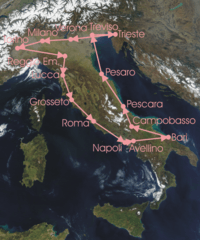1927 Giro d'Italia
 | |||
| Race Route | |||
| Race details | |||
|---|---|---|---|
| Dates | 15 May – 6 June | ||
| Stages | 15 | ||
| Distance | 3,758.3 km (2,335 mi) | ||
| Winning time | 144h 15' 35" | ||
| Results | |||
| Winner | (Legnano) | ||
| Second | (Legnano) | ||
| Third | (Wolsit-Pirelli) | ||
| Team | Legnano | ||
The 1927 Giro d'Italia was the 15th edition of the Giro d'Italia, a cycling race organized and sponsored by the newspaper La Gazzetta dello Sport. The race began on 15 May in Milan with a stage that stretched 288 km (179 mi) to Turin, finishing back in Milan on 6 June after a 291.5 km (181 mi) stage and a total distance covered of 3,758.3 km (2,335 mi). The race was won by the Alfredo Binda of the Legnano team. Second and third respectively were the Italian riders Giovanni Brunero and Antonio Negrini.
266 riders started the race, and 80 crossed the finish line of the final stage.
It was the first Giro with a modern design: in the same period of time of the previous Giro, three more stages were included, which replaced three days of rest. At the same time the stages became shorter (only one passed 300 km).
In 1927 Binda was at the apex of its career, and it triumphed winning 12 stages out of 15: a record still to be surpassed. Binda led the general classification from the first to the last stage (only Girardengo had already done it, in the 1919 Giro). In Binda's team there was also his brother Albino, as a support rider.
Giovanni Rossignoli, "virtual" winner of the first edition in 1909, participated for the last time. He was 45 years old and concluded the race in 44th place, about 7 hours behind Binda.
Participants
Of the 266 riders that began the Giro d'Italia on 15 May, 80 of them made it to the finish in Milan on 6 June. Riders were allowed to ride on their own or as a member of a team. There were six teams that competed in the race: Aliprandi-Pirelli, Bianchi-Pirelli, Berettini-Hutchinson, Ganna-Dunlop, Legnano-Pirelli, and Wolsit-Pirelli.[1]
The peloton was primarily composed of Italians.[1] The field featured three former Giro d'Italia champions in three-time winner and reigning champion Giovanni Brunero, along with one-time winners Alfredo Binda and Giuseppe Enrici.[1] Other notable Italian riders that started the race included Arturo Bresciani, Giovanni Rossignoli, and Domenico Piemontesi.[1]
Final standings
Stage results
| Stage | Date | Course | Distance | Type[Notes 1] | Winner | Race Leader | |
|---|---|---|---|---|---|---|---|
| 1 | 15 May | Milan to Turin | 288 km (179 mi) | |
Stage with mountain(s) | |
|
| 2 | 17 May | Turin to Reggio Emilia | 321 km (199 mi) | |
Stage with mountain(s) | |
|
| 3 | 19 May | Reggio Emilia to Lucca | 207 km (129 mi) | |
Stage with mountain(s) | |
|
| 4 | 20 May | Lucca to Grosseto | 240 km (149 mi) | |
Plain stage | |
|
| 5 | 22 May | Grosseto to Rome | 257.6 km (160 mi) | |
Stage with mountain(s) | |
|
| 6 | 23 May | Rome to Naples | 256.8 km (160 mi) | |
Plain stage | |
|
| 7 | 24 May | Naples to Avellino | 153.4 km (95 mi) | |
Stage with mountain(s) | |
|
| 8 | 26 May | Avellino to Bari | 271.8 km (169 mi) | |
Stage with mountain(s) | |
|
| 9 | 27 May | Bari to Campobasso | 243.6 km (151 mi) | |
Plain stage | |
|
| 10 | 29 May | Campobasso to Pescara | 220.2 km (137 mi) | |
Stage with mountain(s) | |
|
| 11 | 30 May | Pescara to Pesaro | 218 km (135 mi) | |
Plain stage | |
|
| 12 | 1 June | Pesaro to Treviso | 305.6 km (190 mi) | |
Plain stage | |
|
| 13 | 2 June | Treviso to Trieste | 208.2 km (129 mi) | |
Plain stage | |
|
| 14 | 4 June | Trieste to Verona | 275.6 km (171 mi) | |
Plain stage | |
|
| 15 | 6 June | Verona to Milan | 291.5 km (181 mi) | |
Stage with mountain(s) | |
|
| Total | 3,758.3 km (2,335 mi) | ||||||
General classification
There were 80 cyclists who had completed all fifteen stages. For these cyclists, the times they had needed in each stage was added up for the general classification. The cyclist with the least accumulated time was the winner.
| Rank | Name | Team | Time |
|---|---|---|---|
| 1 | |
Legnano-Pirelli | 144h 15' 35" |
| 2 | |
Legnano-Pirelli | + 27' 24" |
| 3 | |
Wolsit | + 36' 06" |
| 4 | |
Legnano-Pirelli | + 51' 20" |
| 5 | |
Berrettini | + 54' 29" |
| 6 | |
Bianchi | + 1h 10' 03" |
| 7 | |
Bianchi | + 1h 11' 54" |
| 8 | |
Ganna | + 1h 32' 14" |
| 9 | |
Wolsit | + 1h 57' 49" |
| 10 | |
— | + 2h 05' 44" |
Notes
- ↑ In 1927, there was no distinction in the rules between plain stages and mountain stages; the icons shown here indicate that the first, second, third, fifth, seventh, eighth, tenth, and fifteenth stages included major mountains.